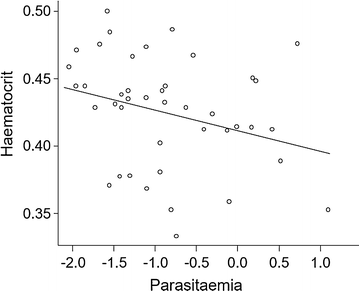Avian malaria and bird humoral immune response
- PMID: 29426311
- PMCID: PMC5807826
- DOI: 10.1186/s12936-018-2219-3
Avian malaria and bird humoral immune response
Abstract
Background: Plasmodium parasites are known to impose fitness costs on their vertebrate hosts. Some of these costs are due to the activation of the immune response, which may divert resources away from self-maintenance. Plasmodium parasites may also immuno-deplete their hosts. Thus, infected individuals may be less able to mount an immune response to a new pathogen than uninfected ones. However, this has been poorly investigated.
Methods: The effect of Plasmodium infection on bird humoral immune response when encountering a novel antigen was tested. A laboratory experiment was conducted on canaries (Serinus canaria) experimentally infected with Plasmodium relictum (lineage SGS1) under controlled conditions. Birds were immune challenged with an intra-pectoral injection of a novel non-pathogenic antigen (keyhole limpet haemocyanin, KLH). One week later they were challenged again. The immune responses to the primary and to the secondary contacts were quantified as anti-KLH antibody production via enzyme-linked immunosorbent assay (ELISA).
Results: There was no significant difference in antibody production between uninfected and Plasmodium infected birds at both primary and secondary contact. However, Plasmodium parasite intensity in the blood increased after the primary contact with the antigen.
Conclusions: There was no effect of Plasmodium infection on the magnitude of the humoral immune response. However, there was a cost of mounting an immune response in infected individuals as parasitaemia increased after the immune challenge, suggesting a trade-off between current control of chronic Plasmodium infection and investment against a new immune challenge.
Keywords: Keyhole limpet haemocyanin; Plasmodium relictum; Serinus canaria.
Figures




Similar articles
-
Host immune responses to experimental infection of Plasmodium relictum (lineage SGS1) in domestic canaries (Serinus canaria).Parasitol Res. 2015 Oct;114(10):3627-36. doi: 10.1007/s00436-015-4588-7. Epub 2015 Jul 7. Parasitol Res. 2015. PMID: 26143864
-
Effect of repeated exposure to Plasmodium relictum (lineage SGS1) on infection dynamics in domestic canaries.Int J Parasitol. 2010 Oct;40(12):1447-53. doi: 10.1016/j.ijpara.2010.04.014. Epub 2010 May 23. Int J Parasitol. 2010. PMID: 20570591
-
Plasmodium spp.: an experimental study on vertebrate host susceptibility to avian malaria.Exp Parasitol. 2015 Jan;148:1-16. doi: 10.1016/j.exppara.2014.11.005. Epub 2014 Nov 18. Exp Parasitol. 2015. PMID: 25450775
-
Immunity, resistance and tolerance in bird-parasite interactions.Parasite Immunol. 2013 Nov;35(11):350-61. doi: 10.1111/pim.12047. Parasite Immunol. 2013. PMID: 23800152 Review.
-
Evolutionary Ecology of Avian Malaria: Past to Present.Trends Parasitol. 2018 Aug;34(8):712-726. doi: 10.1016/j.pt.2018.06.002. Epub 2018 Jun 21. Trends Parasitol. 2018. PMID: 29937414 Review.
Cited by
-
Does malaria infection increase the risk of predation-related mortality during bird migration?iScience. 2024 Nov 8;27(12):111358. doi: 10.1016/j.isci.2024.111358. eCollection 2024 Dec 20. iScience. 2024. PMID: 39640580 Free PMC article.
-
Artificial light at night amplifies seasonal relapse of haemosporidian parasites in a widespread songbird.Proc Biol Sci. 2020 Sep 30;287(1935):20201831. doi: 10.1098/rspb.2020.1831. Epub 2020 Sep 23. Proc Biol Sci. 2020. PMID: 32962545 Free PMC article.
-
Avian Malaria in Penguins: Diagnostics and Future Direction in the Context of Climate Change.Animals (Basel). 2022 Feb 28;12(5):600. doi: 10.3390/ani12050600. Animals (Basel). 2022. PMID: 35268169 Free PMC article. Review.
-
Experiment in semi-natural conditions did not confirm the influence of malaria infection on bird attractiveness to mosquitoes.Parasit Vectors. 2022 Jun 2;15(1):187. doi: 10.1186/s13071-022-05292-w. Parasit Vectors. 2022. PMID: 35655262 Free PMC article.
-
The effect of dietary antioxidant supplementation in a vertebrate host on the infection dynamics and transmission of avian malaria to the vector.Parasitol Res. 2018 Jul;117(7):2043-2052. doi: 10.1007/s00436-018-5869-8. Epub 2018 May 9. Parasitol Res. 2018. PMID: 29744700 Free PMC article.
References
-
- Norris K, Evans MR. Ecological immunology: life history trade-offs and immune defense in birds. Behav Ecol. 2000;11:19–26. doi: 10.1093/beheco/11.1.19. - DOI
MeSH terms
Substances
Grants and funding
LinkOut - more resources
Full Text Sources
Other Literature Sources

